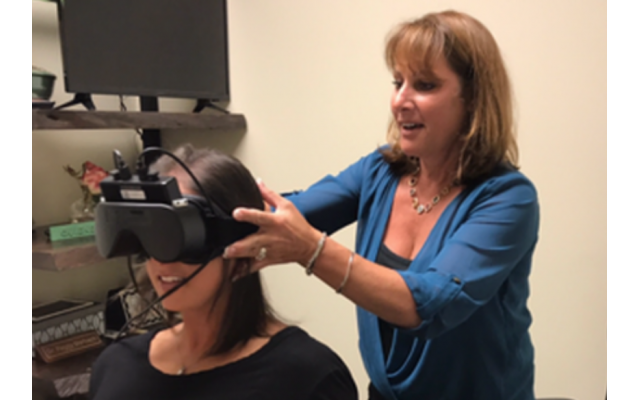Local Expert Offers Hope for Vertigo Relief
Dr. Peggy Marbach has been treating patients with vestibular illnesses, vertigo and related imbalance for more than 30 years.
After 37 years with the Atlanta Journal-Constitution and now with the AJT, , Jaffe’s focus is lifestyle, art, dining, fashion, and community events with emphasis on Jewish movers and shakers.
Dr. Peggy Marbach has been treating patients with vestibular illnesses, vertigo and related imbalance for more than 30 years. Operating her own practice near Northside Hospital, she addresses this annoying and sometimes debilitating condition with specific evaluations and treatment plans.
“We have over a 90 percent improvement rate treating classic positional vertigo and help to retrain the brain to accept dizzy feelings as normal by strengthening the vestibular system,” she said. “Sometimes it is a matter of getting the stronger ear system to work harder to reduce dizziness. My goal is to keep patients engaged in their normal realm of daily activities.”
Read what Dr. Marbach has to say about the latest technology and advice for dealing with this problem:
Jaffe: I hear of so many friends and family members with these issues. Is it more prevalent now?
Marbach: No, it’s not, but people have become more aware that there is treatment for dizziness and are talking more about vertigo.
Jaffe: What type of doctor are you?
Marbach: I have my clinical doctorate in occupational therapy. For me, as a therapist, “Your life is your occupation.” My goal is to help you return to your normal life with activity related programs.
Vertigo, vestibular weakness and dizziness-related conditions are often not seen as life threatening, however dizziness increases the likelihood of falls, which can be life-threatening. People may not go to a doctor for dizziness, or their internists may not know where to send them for treatment. The first step is to confirm with your physician that there are no underlying issues like stroke, heart disease or abnormal blood pressure.
Jaffe: Why do patients succumb to this?
Marbach: It is not hereditary. Sometimes it can be prompted by a virus. The gravity receptors, or “crystals” can get out of place and stuck in the semi-circular canals [of the inner ear] where they do not belong. If crystals are pressing on those nerves, the eyes may jerk and shift, which causes the dizziness.
Jaffe: How do you go about changing this?
Marbach: Positional vertigo is a mechanical problem of the inner ear, and we have to physically move the crystals out of the canals and back where they belong. For weakness of the system, we have to retrain the brain to accept this movement as normal. I use a highly technical video goggle testing system to get a true image of what is off and where problems exist. Then I design a very specific program to get the head movement to shift/tilt the ear canal so the gravity receptors can be redirected back to the center of the vestibular system. After the evaluation, we develop a comprehensive home exercise program that the patient completes twice daily. Clinic treatment continues once every two weeks for about six to 12 weeks. When symptoms resolve, patients continue their exercises three times weekly, like taking vitamins to keep the system strong.
Jaffe: What do you see when you look through goggles?
Marbach: The goggles allow me to see abnormal eye movements under intense magnification to where problems exist.
Jaffe: For what do you use Kinesio Tape?
Marbach: Patients often avoid movement because it causes dizziness, and the tape helps relax tense head and neck muscles, like getting a 24/7 massage, so they can do their exercises.
Jaffe: What advice would you give to folks dealing with this?
Marbach: It’s important to see a vestibular specialist with proper diagnostic equipment and individualized treatment plans. Doing generic exercises online may not be accurate or effective. I teach patients the most effective way to do the exercises.
In the aging population, treatment of dizziness is vital for fall prevention. Stay active and keep exercising.
Jaffe: Is this more prevalent in Jewish people? My mother and grandmother were often complaining of dizziness.
Marbach: Nothing specifically Jewish. But we need to keep you well-balanced, so you won’t fall during your challah baking!
For more information, visit www.dizzysolutionsatlanta.com.




comments